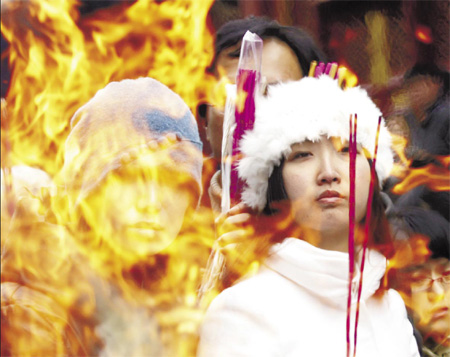Society
- Details
- By Mengxin
- Hits: 963

People burn incense at the Lama Temple on Sunday to mark Lantern Festival.
More than 43,000 people went to Yonghegong, or the Lama Temple, to burn incense on Sunday, the last day of the Spring Festival and the 15th day of the lunar calendar.
That figure was 8,000 more than on the same lunar day last year, although well below the 60,000 that passed through the temple's gates on the first day of this year's Spring Festival.
Yonghegong stopped ticket sales at 4:30 pm and the precise figure given did not include complimentary tickets given out to lay Buddhists, said Wang Jinhua, chief of the administrative department at the temple.
The first and 15th day of every lunar month are typically the busiest days for temples in terms of guests because tradition dictates these are the days when Buddha is on duty.
And the first month is particularly special because followers of the faith come to make wishes for the entire year.
- Details
- By Mengxin
- Hits: 734
China's leaders begin challenging goal of cutting carbon emissions
China's highest leadership Tuesday began considering proposals from the country's senior researchers in an attempt to help achieve the country's ambitious goal of cutting carbon intensity by 40 to 45 percent by 2020.
The move is a sign that China will roll out more economic and industrial policies to tackle climate change this year when drawing up the development roadmap for the 12th Five-Year Plan (2011-15).
The political bureau of the CPC Central Committee has raised climate change as their study topic for the second time during the past two years. The leadership usually holds study meetings every one or two months.
At the study meeting in Beijing, President Hu Jintao said China is committed to fighting climate change, and the leadership will be working hard to mobilize efforts to realize the goal, which China came up with shortly before the Copenhagen summit.
Ever since Nov 26 last year, when China pledged to cut carbon intensity by 40 to 45 percent (from 2005 levels) before 2020, China's leaders, especially Premier Wen Jiabao, have been involved in intensive diplomatic efforts, including wide-ranging telephone talks with world leaders, to move forward the Copenhagen agenda.
However, some countries, including Britain, have accused China of obstructing December's Copenhagen climate summit, which ended with a non-binding accord that set a target of limiting global warming to a maximum 2 C, but was scant on details.
"We must fully recognize the importance, urgency and difficulty of dealing with climate change," Hu said in an address to other high-ranking leaders after listening to lectures by Pan Jiahua, senior researcher with Chinese Academy of Social Sciences, and Xu Huaqing, director of the Energy Research Institute affiliated with the National Development and Reform Commission.
"We must make it an important strategy for our socio-economic development," Hu said.
- Details
- By Mengxin
- Hits: 783
Chinese mobile users sent about 23 billion text messages during Chinese New Year, a year-on-year increase of ten percent, according to the Ministry of Industry and Information Technology, cited by the Beijing Times.
About 735 million mobile users from three major telecom operators sent an average of 31 text messages each during the Spring Festival with 13 million sent in the first two days alone, according to report.
A total of 1.3 billion multimedia messages were sent during the festival, an increase of 40 percent. The photo service also climbed compared with last year.
- Details
- By Mengxin
- Hits: 1156


An old Chinese saying goes that extreme joy begets sorrow. That was the case Thursday night when fireworks ignited the last standing tower on an ancient city gate in Zhengding county in North China's Hebei province.
The local government estimated financial losses at approximately 1 million yuan ($146,000).
Local authorities said yesterday that a preliminary investigation revealed that fireworks ignited the blaze, China News Service reported.
The report did not
- Details
- By David Cao
- Hits: 721
Ahead of the Spring Festival, some Chinese e-shopping enthusiasts are in a panic over the suspension of delivery services due to the national holiday.
Zhang Chi, a 26-year-old self-confessed "shopaholic", struggled with a stack of stuff she purchased online at Taobao, China's largest online retail site. Recently, the trunk and backseat of her Volkswagen Beetle have been full of express delivery packages and boxes.
 "I felt really anxious when I heard that many store owners would suspend order acceptance, though only for two weeks," she said.
"I felt really anxious when I heard that many store owners would suspend order acceptance, though only for two weeks," she said.
Zhang said she spent more than 3,000 yuan ($439.43) over the last five days buying stuff from Taobao. "I think I'm suffering from a sort of Taobao syndrome. When I'm browsing the web, I cannot help buying items because I always feel I need this or I'm lacking that."
Zhang bought three boxes of Fancy Deluxe Tense Up, a Japanese beauty drink she takes every day, as well as other cosmetic products, saying some particular items are only available on the site and the prices were reasonable.
"New clothes are at the top of my must-have list because I will visit my boyfriend's family and also attend many parties with friends during the Spring Festival. Clothes on Taobao are cheaper than department stores and some of them are made by independent designers."
Read more: online retailers suspend delivery services during Chinese spring festival
More Articles …
Page 161 of 255